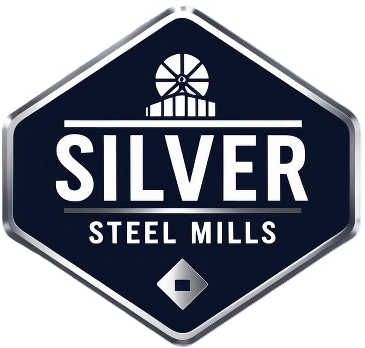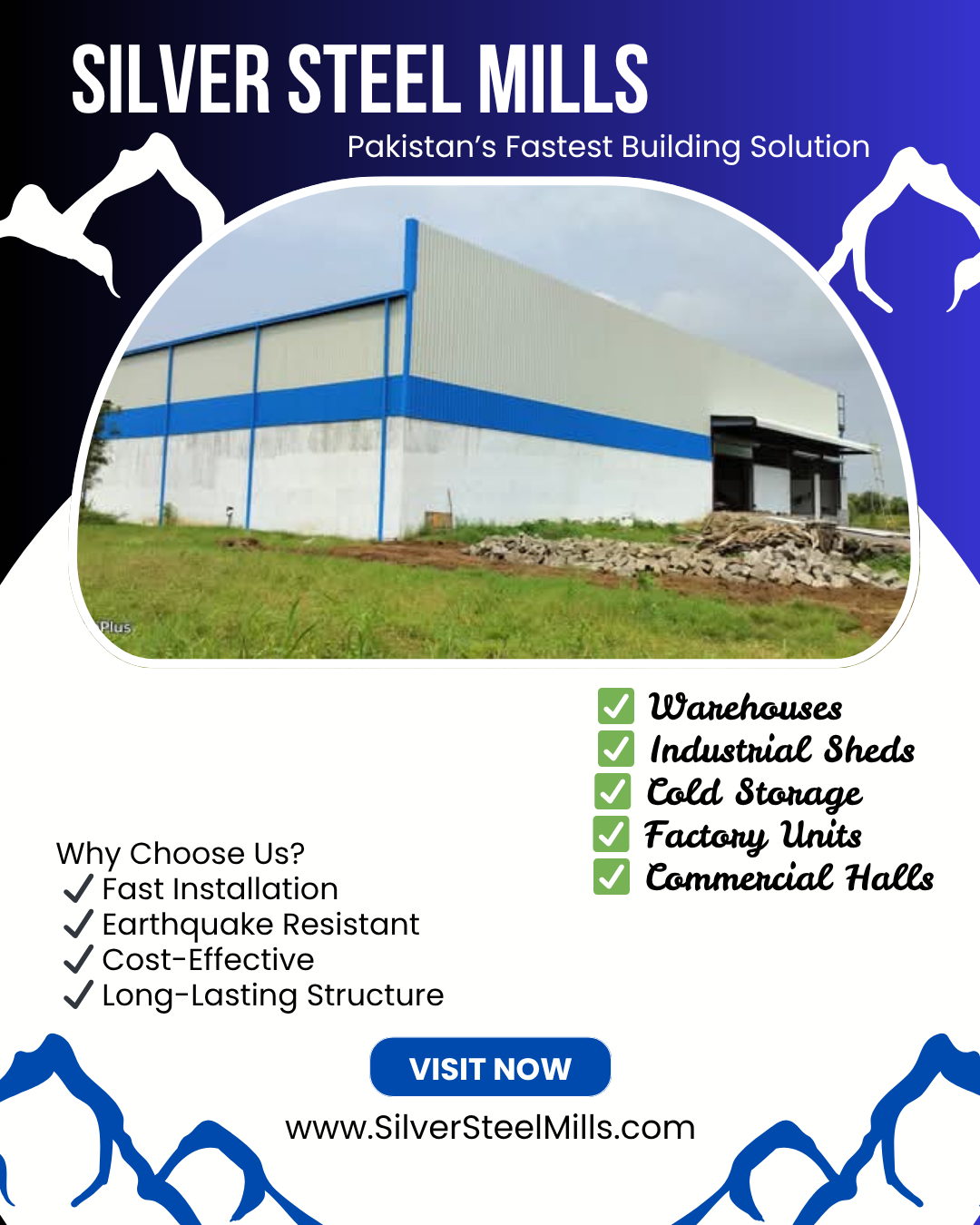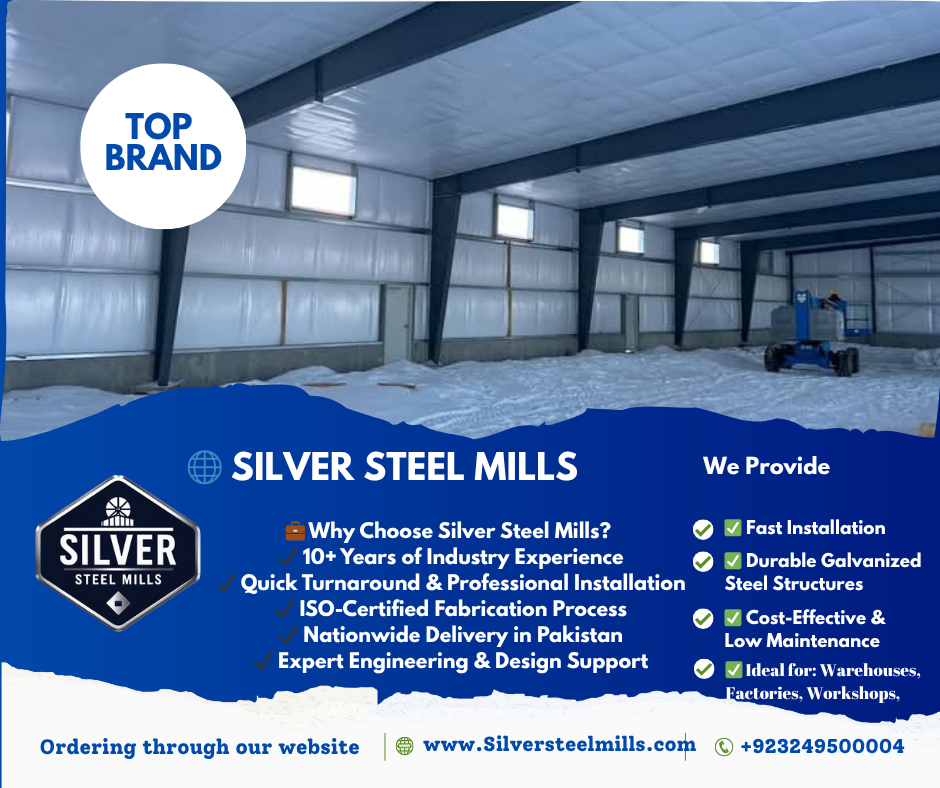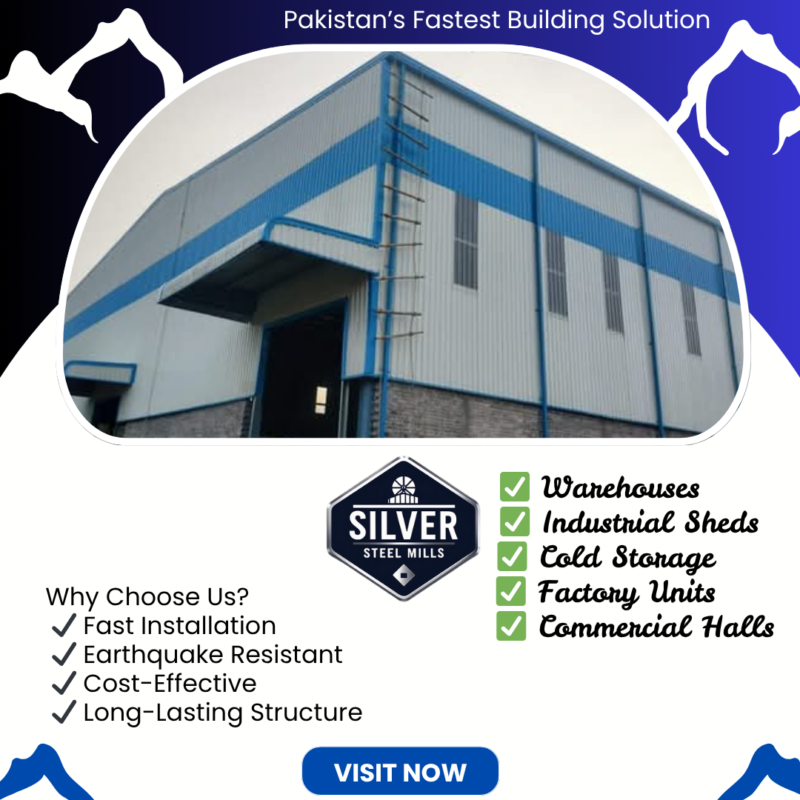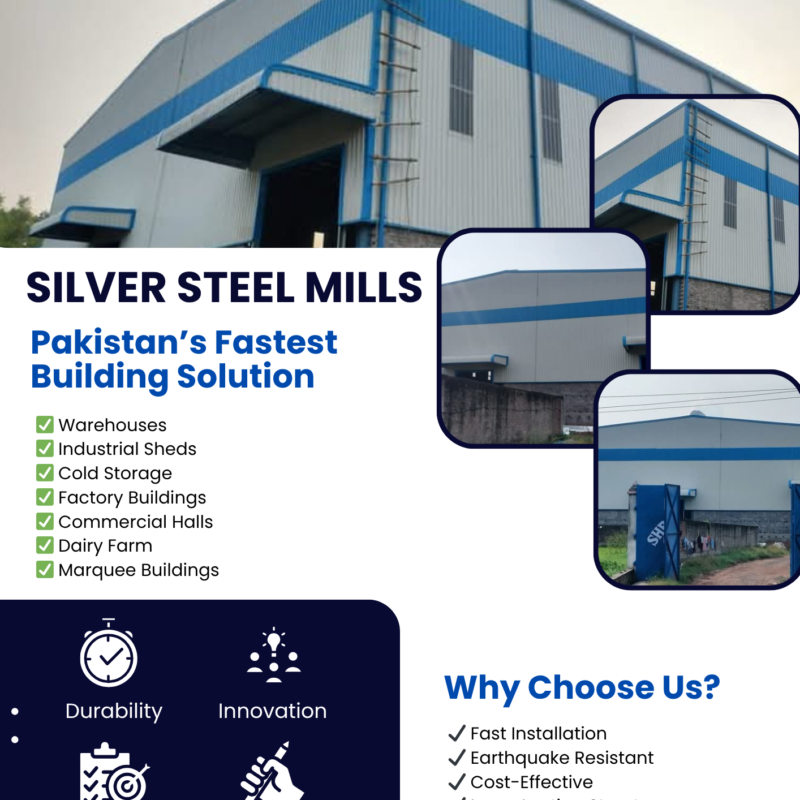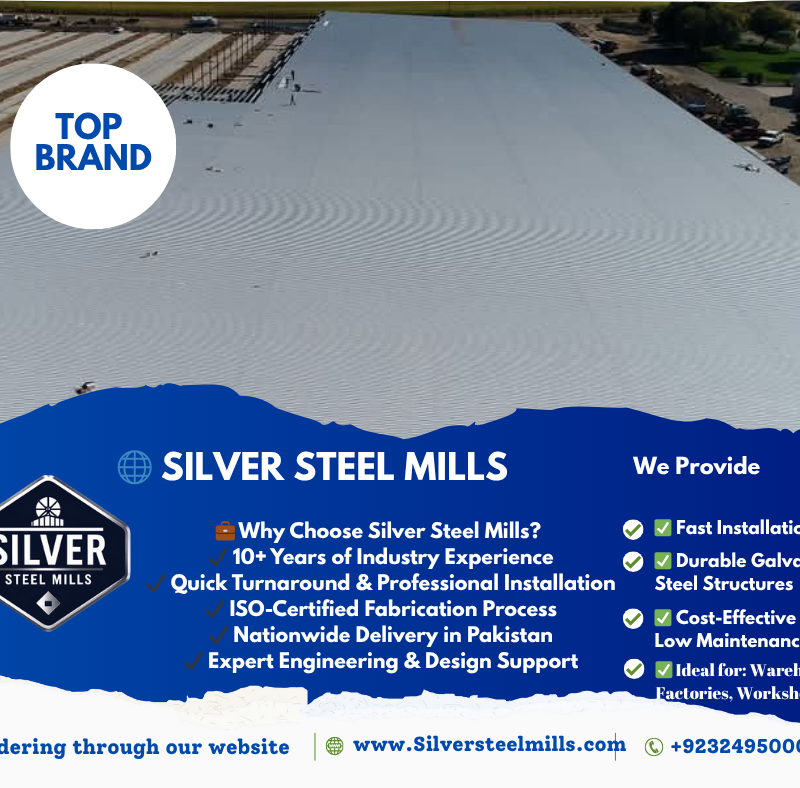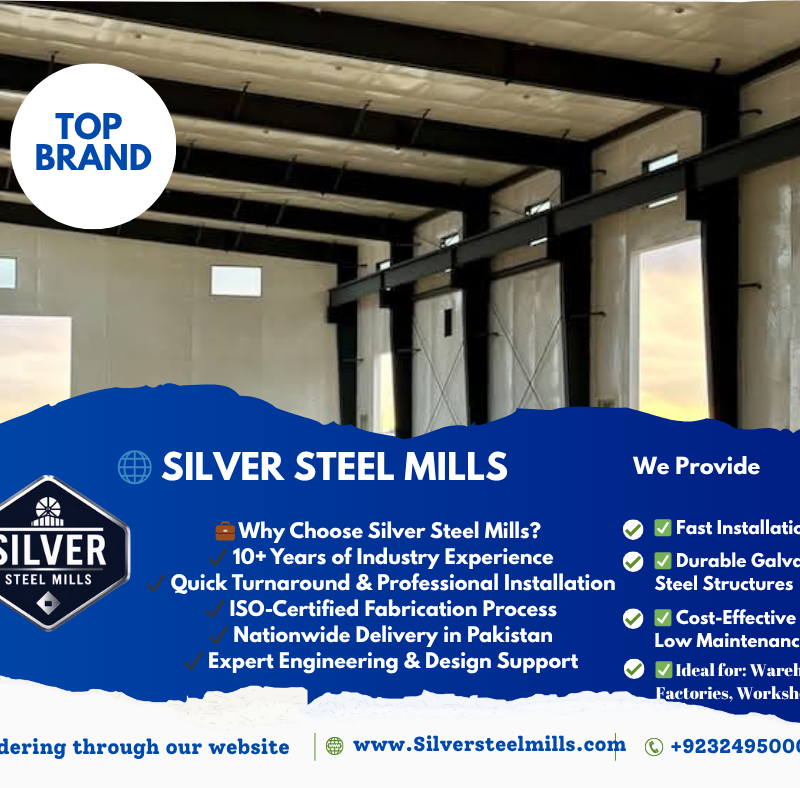Description
In the ever-evolving construction landscape of Pakistan, prefab buildings have emerged as a modern, efficient, and cost-effective solution for residential, commercial, and industrial needs. Whether you’re building a new office, a school, a warehouse, or even a home, prefab construction offers unmatched speed, durability, and design flexibility — and it’s gaining ground rapidly in Pakistan.
What Are Prefab Buildings?
Prefab buildings (short for prefabricated buildings) are structures built from factory-made components that are transported to the construction site and assembled on location. Unlike traditional construction, which requires extensive on-site labor, prefab buildings significantly reduce build times, labor costs, and material waste.
Types of Prefab Structures:
-
Prefab homes
-
Modular buildings
-
Steel prefab warehouses
-
Prefab site offices
-
Container-based prefab units
These types are widely used in urban and rural areas throughout Pakistan, especially where quick deployment and cost-effectiveness are important.
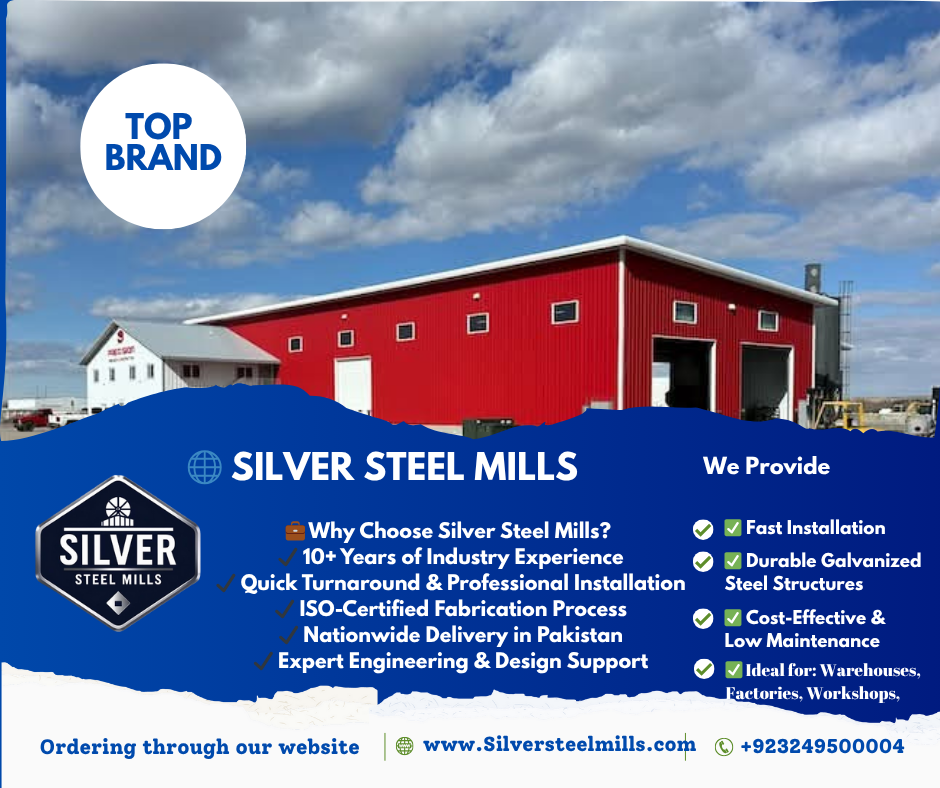
Growing Demand in Pakistan
Over the past decade, the demand for prefabricated buildings in Pakistan has surged. This growth is driven by:
-
Urbanization and infrastructure development
-
Commercial expansion (factories, offices, warehouses)
-
Housing shortages and rapid population growth
-
Government projects (schools, hospitals, low-cost housing)
-
Natural disaster response (earthquake and flood-prone areas)
With a need for speed, sustainability, and affordability, prefab buildings are becoming the preferred choice across Pakistan — from Karachi to Lahore, Islamabad to Peshawar.
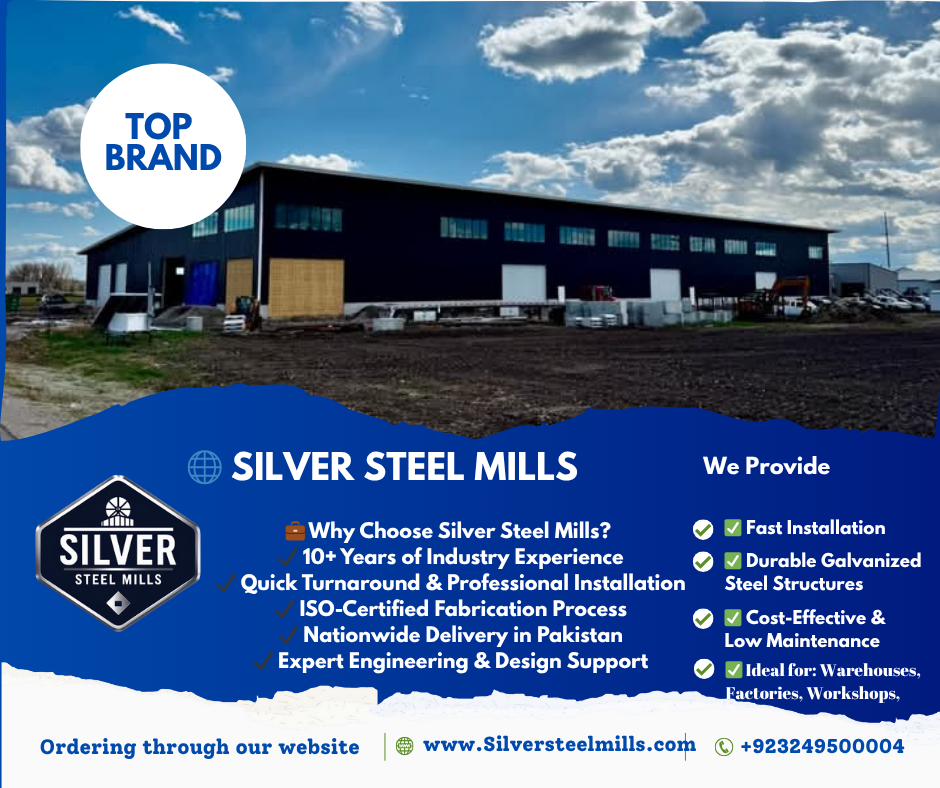
Benefits of Prefab Buildings in Pakistan
Choosing prefab buildings in Pakistan brings several important benefits that make them a smarter and more reliable choice than traditional brick-and-mortar construction. Below are the top reasons why individuals, companies, and institutions across Pakistan are turning to prefabricated solutions for their building needs.
1. Fast Construction Time
One of the biggest advantages of prefab buildings is speed. While traditional buildings can take months or even years to complete, prefab buildings are built 50% to 70% faster. The parts are made in a factory and delivered ready to install, which cuts down on weather delays and unnecessary downtime.
Example: A prefab school building in Punjab was assembled in just 30 days, compared to the 5–6 months needed for a concrete building.
2. Cost-Effective and Budget-Friendly
Prefab construction is cheaper than traditional construction, especially in terms of labor and material waste. In Pakistan, where construction costs are rising, prefab offers an affordable solution without compromising on strength or quality.
Lower labor costs
Minimal material wastage
Predictable project costs
3. Earthquake & Weather Resistant
Pakistan is prone to earthquakes and floods in certain regions. Prefab buildings can be designed to resist such natural disasters by using steel and insulated panels that are durable and compliant with safety standards.
Prefab buildings built by Silver Steel Mills are engineered for seismic zones and high wind resistance.
4. Mobility and Portability
Need to move your office or housing unit to a new location? Prefab buildings are relocatable, making them ideal for temporary offices, site accommodations, and mobile clinics.
Container-based prefab units can be shifted from Lahore to Multan or Karachi to Gwadar easily with minimal effort.
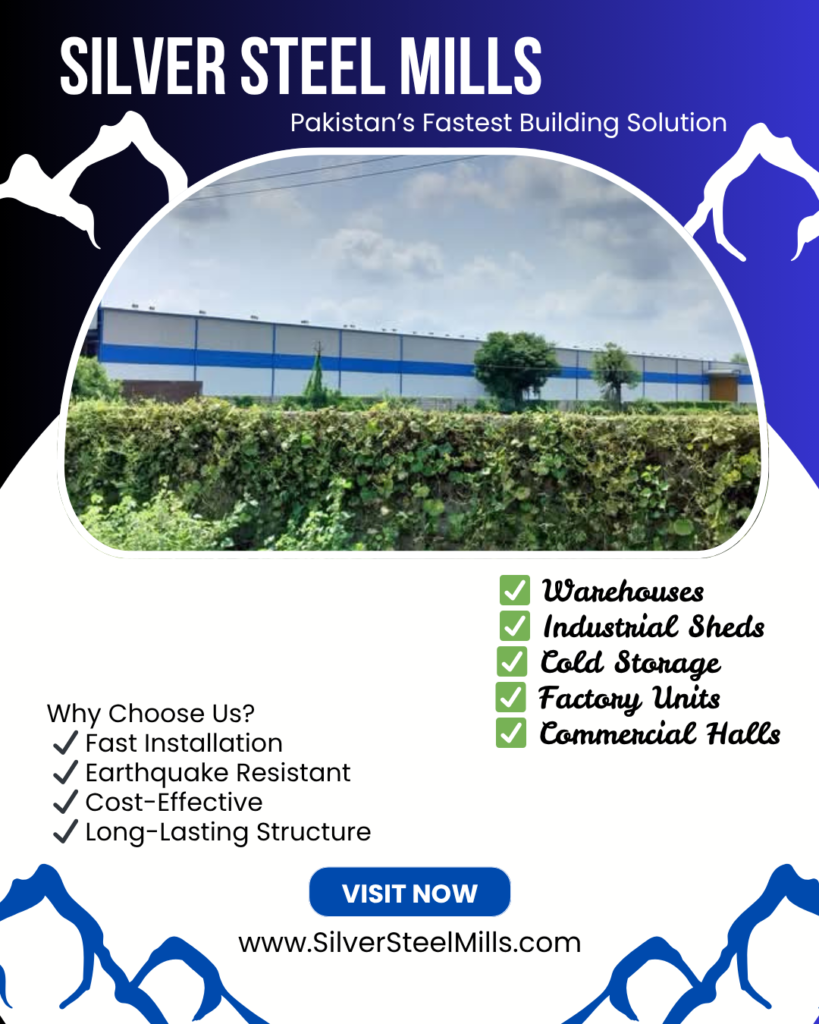
5. Environmentally Friendly
Prefab construction is more eco-friendly than conventional methods because:
-
Materials are recyclable
-
Wastage is reduced by up to 90%
-
Energy-efficient designs reduce electricity bills
With Pakistan’s growing focus on sustainable development, green prefab buildings are gaining popularity, especially in corporate and NGO sectors.
6. Customization and Design Flexibility
Many people think prefab buildings are all the same — but that’s not true. SilverSteelMills.com offers fully customizable prefab solutions that match your style and functional needs.
Options include:
Office partitions
False ceilings
Custom-sized windows and doors
Decorative exterior finishes
7. Low Maintenance Costs
Prefab steel buildings, especially when insulated with EPS or PU panels, require minimal maintenance. They don’t crack, rot, or get infested by termites, unlike traditional wooden or concrete buildings.
8. Government and Corporate Acceptance
Today, major companies and even government bodies in Pakistan are using prefab buildings for:
-
Schools (PEF, NCHD)
-
Site offices (construction companies like FWO, NLC)
-
Hospitals and clinics
-
Corporate offices and warehouses
This shows increasing trust in prefab technology as a reliable construction solution.
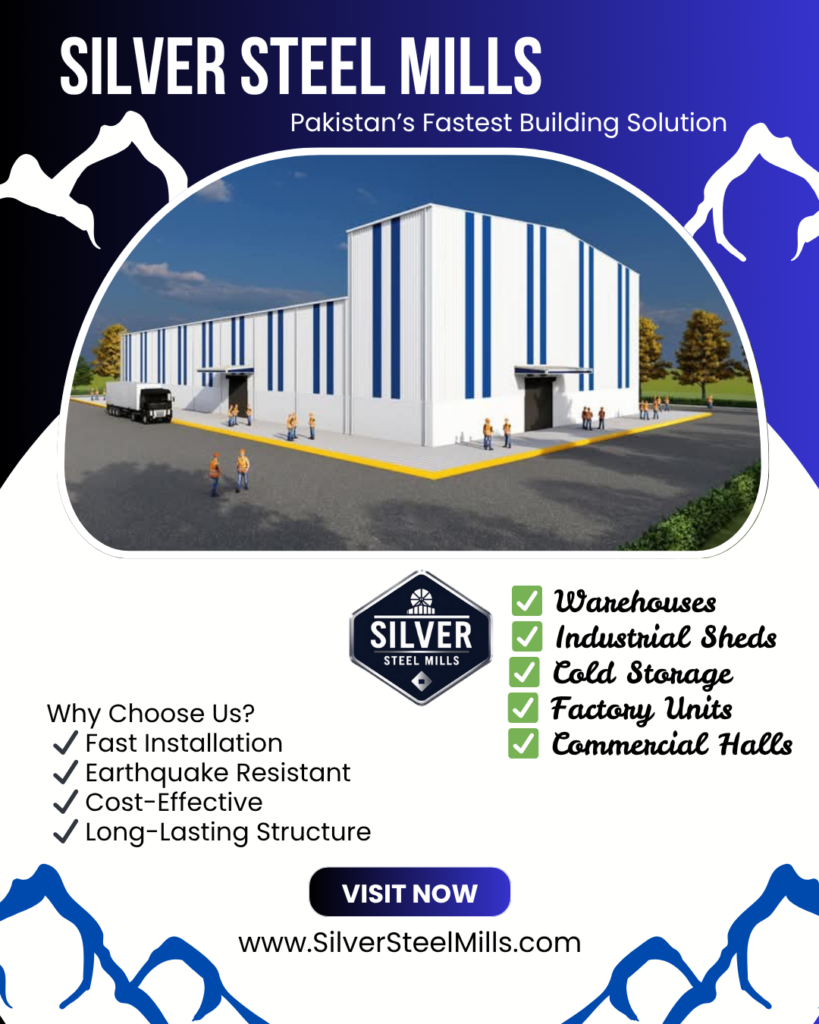
Types of Prefab Buildings in Pakistan
The prefab construction industry in Pakistan offers a wide range of structures tailored to specific needs. From residential prefab houses to industrial steel sheds, prefab buildings have transformed how people build in Pakistan. Here are the most popular and in-demand types:
1. Prefab Homes in Pakistan
Prefab homes are one of the fastest-growing housing solutions in Pakistan. With the rise in population and urban sprawl, prefab homes offer a quick, cost-efficient, and modern alternative to conventional homes.
Key Features:
-
Available in single-story or double-story options
-
Use of insulated sandwich panels for walls and roofing
-
Complete electrical, plumbing, and interior finish included
-
Easily expandable
Ideal for: Low-cost housing schemes, remote village housing, disaster-resilient homes, farmhouses
2. Modular Prefab Offices
These are ready-to-use modular buildings that function as offices for construction sites, industries, NGOs, schools, and government departments.
Available Formats:
-
Portable single cabins
-
Multi-room office blocks
-
Executive prefab buildings with glass front panels
Common in: Lahore, Karachi, Faisalabad, Islamabad, and Gwadar project sites
3. Prefab Schools and Classrooms
Due to the need for fast deployment of educational infrastructure in rural and flood-affected areas, prefab schools have become a practical solution.
Benefits:
-
Installed within weeks
-
Cost-effective for NGOs and government
-
Thermal insulation keeps interiors cool in summers
-
Easily partitioned into classrooms, staff rooms, and toilets
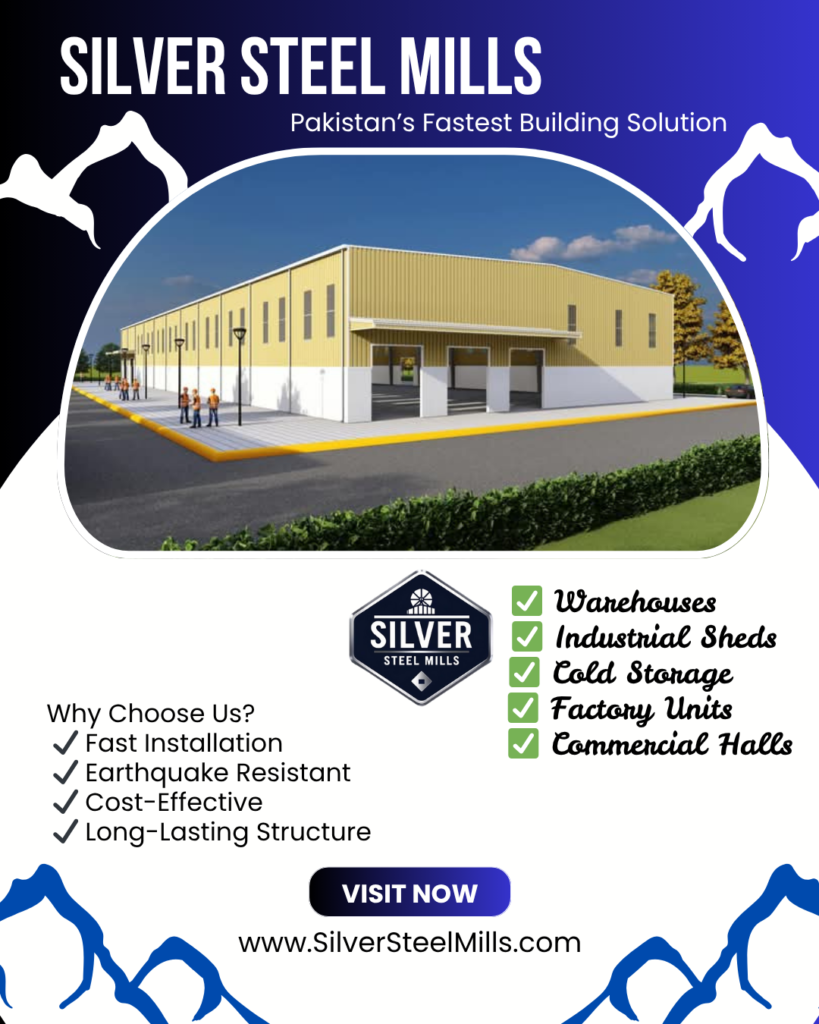
4. Steel Warehouses and Industrial Sheds
For factories, cold storage, and logistic hubs, prefab steel warehouses are widely used.
Features:
-
Large clear span up to 40 meters
-
Galvanized steel structure with PEB design
-
PU/EPS insulated panels or metal sheeting
-
Heavy-duty doors and rolling shutters
Popular keywords: steel shed, steel warehouse, iron shed in Pakistan
5. Container Homes and Offices
These prefabricated containers are perfect for temporary housing, military accommodation, security booths, or on-site project offices.
Types:
-
20 ft and 40 ft standard size
-
Modified containers with AC, lighting, and bathroom fittings
-
Stackable for two-story accommodation
Ideal for CPEC route areas and remote construction locations
6. Labor Accommodation Units
Large construction projects like dams, highways, or industrial parks require housing for labor. Prefab labor camps solve this need with dormitory-style buildings that are easy to build and relocate.
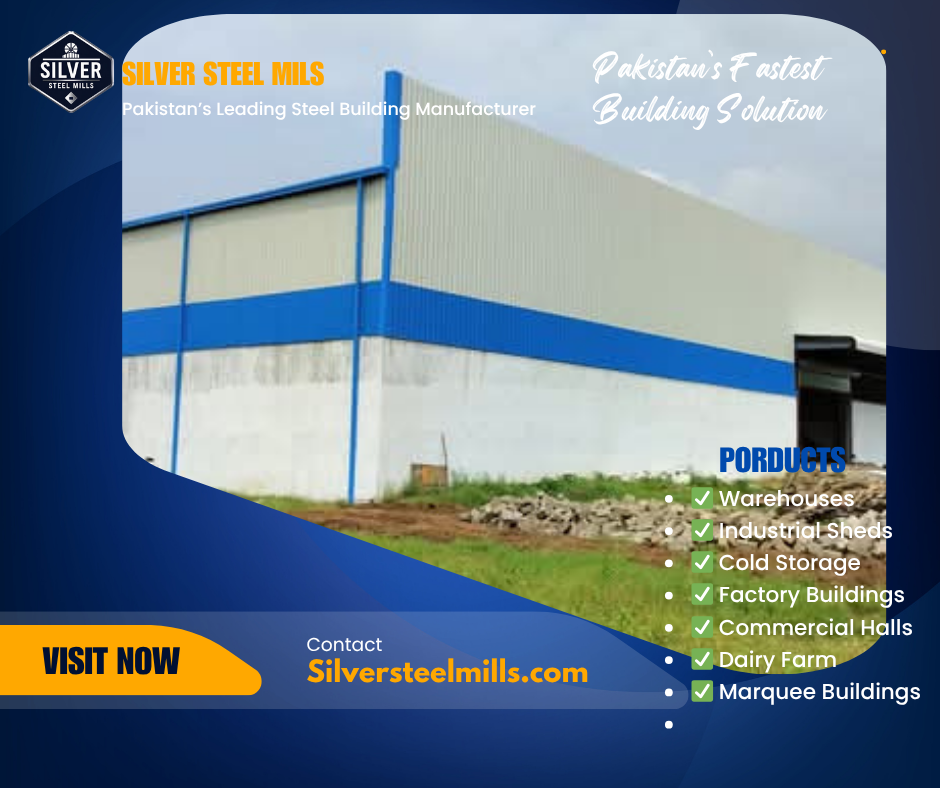
7. Prefab Toilets and Bathrooms
These are small, self-contained prefab units used at construction sites, public events, parks, and government projects.
Features:
-
FRP or insulated wall panels
-
Flush system and plumbing pre-installed
-
Solar power optional
8. Guard Rooms and Security Cabins
These small but important prefab structures are used in:
-
Banks
-
Housing societies
-
Government buildings
-
Private companies
Each of these prefab building types can be customized according to your site size, budget, design, and function, ensuring maximum usability for clients across Pakistan.
Materials and Technology Used in Prefab Buildings in Pakistan
Prefab construction isn’t just about assembling structures quickly — it’s also about using advanced materials and smart engineering techniques that ensure strength, durability, and energy efficiency. At SilverSteelMills.com, we use the latest prefab construction materials to meet the growing demand for fast, reliable, and cost-effective buildings in Pakistan.
Below is a detailed look at the main components and technologies used in prefab buildings.
1. Steel Structure Framework (Galvanized & Pre-Painted Steel)
The main skeleton of most prefab buildings is made from hot-dip galvanized steel or pre-painted galvanized iron (PPGI). This gives the structure long-lasting strength and corrosion resistance — essential in Pakistan’s hot, humid, and dusty environments.
Key Benefits:
-
High strength-to-weight ratio
-
Long life span (20+ years)
-
Earthquake-resistant
-
Fire-retardant
Commonly used for: Steel sheds, warehouses, container buildings, and large modular halls
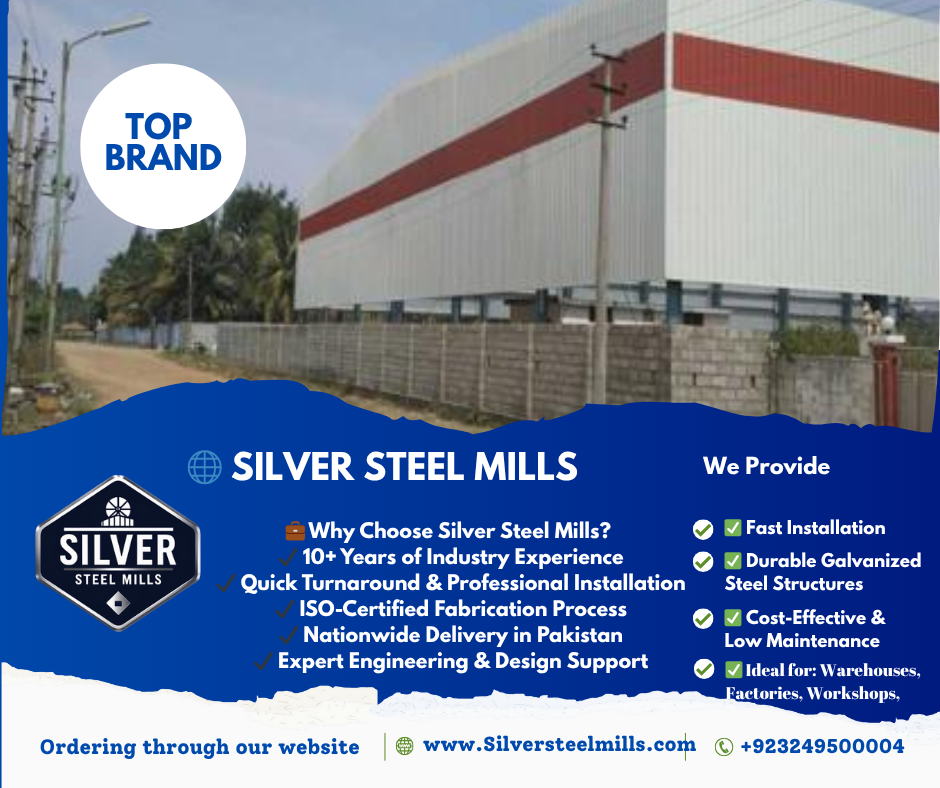
2. Sandwich Panels for Walls and Roofs
To provide thermal insulation, soundproofing, and water resistance, we use sandwich panels made with an insulated core and steel surface.
Types of Panels:
-
EPS Panels (Expanded Polystyrene): Light, economical, and good for general insulation
-
PUF Panels (Polyurethane Foam): Excellent insulation, ideal for cold storage or extreme climates
-
Rockwool Panels: Fireproof and soundproof, ideal for hospitals, schools, and offices
Panel Specifications:
-
Thickness: 50mm to 150mm
-
Width: 1 meter
-
Length: Custom sizes up to 6 meters
-
Insulation value: R-Value compliant with global energy standards
Roofing panels come with ribbed or corrugated profiles for extra strength and rainwater drainage.
3. Container Base & Frame (ISO Standard Shipping Containers)
For portable prefab buildings, ISO-grade shipping containers are modified to create homes, offices, guard rooms, and site accommodations.
Features:
-
Corten steel construction (rust-resistant)
-
Reinforced flooring
-
Built-in insulation, electrical wiring, lighting, and windows
-
Stackable (2-story possible)
4. Flooring Options
Silver Steel Mills offers various prefab flooring types based on the client’s needs:
-
Vinyl flooring (anti-slip, water-resistant)
-
Cement board over steel base (for industrial use)
-
Tile flooring (for home and office use)
5. Doors and Windows
Standard prefab buildings include:
-
UPVC or aluminum windows with sliding or fixed glass
-
Steel or composite doors
-
Optional mosquito nets, double glazing, and burglar-proof designs
6. Electrical and Plumbing Systems
Each prefab building comes pre-installed with:
-
Lighting, ceiling fans, switchboards
-
Wiring compliant with NEPRA standards
-
PPR plumbing pipes
-
Optional water tanks, geysers, and bathroom fittings
7. Solar Power and Green Add-ons (Optional)
In areas with limited electricity access, prefab buildings can be equipped with:
-
Solar panels
-
Battery storage systems
-
Energy-efficient LED lighting
This option is highly popular in Khyber Pakhtunkhwa, Balochistan, and remote areas of Sindh.
8. Welding & Jointing Technology
Advanced MIG and TIG welding techniques ensure the steel structure is:
-
Stable
-
Precise
-
Long-lasting
We also use bolt-connected joints in larger prefab steel buildings for fast assembly and easy dismantling.
9. Paints and Coatings
To withstand Pakistan’s harsh climates, our prefab structures are coated with:
-
Anti-corrosive zinc-rich primer
-
UV-resistant PU paint
-
Powder-coated finishes for interior surfaces
This detailed use of modern materials and technologies ensures that every prefab building by SilverSteelMills.com delivers long life, comfort, and performance—whether it’s in the heat of Sindh or the snow of northern Pakistan.
Prefab Construction Process – Step-by-Step Guide in Pakistan
Many customers in Pakistan are unfamiliar with how prefab buildings are designed, manufactured, and installed. At SilverSteelMills.com, we follow a streamlined, transparent, and professional process to deliver ready-to-use prefab buildings — whether it’s a steel shed, modular office, or prefab home.
Here’s a breakdown of our step-by-step prefab construction process:
Step 1: Consultation and Requirements Gathering
Our journey starts with understanding your needs.
✅ We ask key questions:
-
What type of prefab building do you need? (e.g., home, warehouse, school, office)
-
What’s your location?
-
What is your size requirement (length x width x height)?
-
How many rooms or sections do you want?
-
Is mobility important (portable or permanent)?
📞 You can share your project via call, WhatsApp, or our online form at SilverSteelMills.com.
Step 2: Site Visit (Optional)
For large-scale projects or complex installations, we arrange a site visit to:
-
Take exact land measurements
-
Check the foundation or ground condition
-
Recommend positioning for sun exposure, ventilation, and drainage
Site visits are usually arranged in major cities like Lahore, Karachi, Islamabad, Peshawar, and Multan.
Step 3: Design & Quotation
Our engineering team prepares:
-
2D & 3D layouts
-
Structural and architectural drawings
-
BOQ (Bill of Quantities)
-
Price quotation
📐 CAD software and PEB design tools are used to optimize steel usage and reduce waste.
You get a clear picture of how the prefab building will look, what materials will be used, and the exact cost before any work begins.
Step 4: Approval and Advance Payment
Once you approve the design and quotation:
-
We sign a mutual agreement
-
You pay an initial advance (typically 40% of the project value)
-
The delivery timeline is locked (usually 15 to 30 days)
🧾 You will receive a formal invoice and production schedule.
Step 5: Manufacturing in Our Factory
The prefab building is not built at your site — instead, it’s manufactured in sections in our controlled factory environment:
🏭 Our workshop in Lahore includes:
-
CNC steel cutting
-
Welding bays
-
Panel pressing
-
Electrical and plumbing pre-fittings
📦 Every section is packed and labeled for quick assembly at the site.
Step 6: Transportation to Your Site
After quality checks, we transport the prefab units using trucks or containers. We ensure:
-
Safe loading and unloading
-
Minimal damage during transport
-
On-time delivery to your doorstep
🛣 We deliver prefab buildings anywhere in Pakistan, from Gwadar to Gilgit.
Step 7: On-Site Assembly & Installation
Our expert team installs the prefab structure within 2 to 10 days, depending on size.
🛠 Assembly includes:
-
Lifting steel structure and bolting it
-
Fixing insulated wall and roof panels
-
Installing windows, doors, flooring
-
Electrical and plumbing final connections
-
Paint touch-ups and sealing
No messy construction, no bricks or cement, no delays. Just fast, clean assembly.
Step 8: Final Inspection and Handover
Once installation is complete:
-
We do a walkthrough with the client
-
Check fittings, alignment, doors, lighting, drainage
-
Fix any last-minute adjustments
✅ After your approval, the final payment is made and we hand over the keys.
Step 9: After-Sales Service
We offer:
-
1-year structure warranty
-
Optional maintenance contract
-
On-call customer support
🛡 Your building is made to last 20+ years with proper maintenance.
Advantages of Prefab Buildings Over Traditional Construction in Pakistan
Prefab buildings are revolutionizing the construction industry in Pakistan. Whether it’s a steel shed for your factory, a modular office, or a site accommodation unit, prefab structures offer advantages that traditional brick-and-mortar buildings simply can’t match.
Here’s a detailed comparison that shows why more Pakistanis are choosing SilverSteelMills.com for prefab construction:
✅ 1. Faster Construction Time
Prefab Buildings:
-
Manufactured off-site in a factory
-
Installation on-site takes 2–10 days
-
No need for curing, drying, or scaffolding
Traditional Construction:
-
Takes 3 to 6 months (or more) depending on the size
-
Involves delays due to weather, labor, and material availability
Time is money — with prefab, you save months of labor and can start operations quickly.
✅ 2. Lower Overall Cost
Prefab Construction:
-
Fixed pricing, no hidden charges
-
Less labor required
-
No material wastage
-
Bulk production reduces unit cost
Traditional Construction:
-
Material theft and waste
-
High labor cost over time
-
Unpredictable budgeting due to delays and design changes
Silver Steel Mills helps customers save up to 30% compared to conventional methods.
✅ 3. Portability and Reusability
Prefab Units:
-
Can be dismantled, moved, or reused
-
Ideal for construction sites, events, or temporary setups
Brick Buildings:
-
Permanent and immovable
-
Can’t be reused once demolished
Especially helpful for mobile offices, site cabins, and guard rooms.
✅ 4. Better Thermal and Sound Insulation
Prefab walls use sandwich panels with foam, PU, or Rockwool insulation:
-
Keeps indoor temperature stable
-
Saves on electricity (AC/heating)
-
Reduces outside noise
Traditional buildings use concrete blocks or red bricks, which:
-
Offer poor insulation
-
Retain heat in summer
-
Are noisy and require extra insulation work
Prefab panels are engineered for comfort and energy efficiency, ideal for Pakistan’s extreme climate zones.
✅ 5. Cleaner and Safer Construction Process
Prefab site assembly:
-
No cement, bricks, or debris
-
Minimal noise and dust
-
Safer for workers and nearby residents
Traditional construction:
-
Involves heavy equipment, wet cement, bricks, etc.
-
Creates noise, dust, and dangerous working conditions
Prefab is environmentally cleaner and perfect for urban areas where space and noise control are essential.
✅ 6. Custom Design Flexibility
Prefab buildings can be:
-
Expanded later (modular design)
-
Customized in shape, size, and color
-
Easily adapted for offices, schools, homes, and factories
Traditional buildings:
-
Expensive and time-consuming to expand
-
Customization during construction adds time and cost
With Silver Steel Mills, you get 3D design previews and fully custom layouts before production.
✅ 7. Eco-Friendly and Sustainable
Prefab construction:
-
Reduces construction waste by 60%
-
Uses recyclable steel and eco-friendly insulation
-
Compatible with solar energy systems
Traditional construction:
-
High cement use = high carbon footprint
-
Excessive material wastage
-
No energy integration during build phase
A green choice for clients who care about the environment and Pakistan’s future.
✅ 8. Strong and Durable in Harsh Conditions
Prefab steel buildings are:
-
Earthquake-resistant
-
Wind-load and snow-load tested
-
Treated for rust and corrosion
-
Fire-resistant with proper coating
Traditional buildings:
-
Vulnerable to seismic activity
-
Bricks degrade with water exposure
-
Costly to retrofit for disasters
Especially critical for northern areas, coastal regions, and industrial zones.
✅ 9. Government Approvals and Certifications
Prefab buildings by Silver Steel Mills:
-
Follow engineering codes of Pakistan
-
Easily approved for industrial and commercial use
-
Used by many public and private sector clients
Traditional constructions:
-
Require multiple NOCs and regulatory approvals
-
May face delays if not built to standard
With prefab, you avoid red tape and fast-track your operations.
In short, Prefab Buildings = Fast + Cost-Efficient + Durable + Customizable.
For smart business owners, real estate developers, NGOs, educational institutions, and industrialists, prefab is the future of construction in Pakistan — and SilverSteelMills.com is the trusted name behind that transformation.
Applications of Prefab Buildings in Pakistan
Prefab buildings are no longer limited to temporary structures. Thanks to modern engineering, steel fabrication, and factory-based precision, prefab buildings are now used across almost every industry in Pakistan.
Whether it’s for commercial, residential, agricultural, or institutional use, SilverSteelMills.com designs customized prefab structures that fit your space, budget, and functional requirements.
Below are the most popular applications of prefab and steel buildings in Pakistan:
🏭 1. Industrial Sheds & Warehouses
Common Use Cases:
-
Textile and garments factories
-
Chemical and pharmaceutical plants
-
Electronics and machinery warehouses
-
Packaging and logistics storage
Why Prefab?
-
Large clear-span areas (no inner columns)
-
Quick to install, expand, or relocate
-
Ideal for storing machinery, equipment, and inventory
-
Easy to install fireproofing and ventilation systems
🔧 Keywords: Industrial steel shed, prefab warehouse, iron shed in Pakistan
🛒 2. Commercial Buildings & Showrooms
Common Use Cases:
-
Car showrooms
-
Department stores and hypermarkets
-
Shopping outlets
-
Cold storage
Why Prefab?
-
Strong structure for wide-open showroom floors
-
Beautiful exterior finishes with glass, ACP, or paint
-
High ceiling designs and long roof spans
-
Temperature and dust control with insulation
🔧 Keywords: Steel showroom buildings, steel commercial building, prefab shopping mall
🏢 3. Modular Office Buildings
Common Use Cases:
-
Construction site offices
-
Remote branch offices
-
Project-based modular buildings
-
Oil and gas site accommodations
Why Prefab?
-
Fully functional with rooms, toilets, and wiring
-
Delivered and installed within days
-
Portable and stackable
-
Reusable for other sites and projects
🔧 Keywords: Prefab office in Pakistan, modular office, site office container, steel site cabin
🏥 4. Medical & Emergency Facilities
Common Use Cases:
-
Field hospitals
-
Emergency response shelters
-
Vaccine and medicine storage units
-
Mobile health units
Why Prefab?
-
Fast deployment during crises (like COVID-19)
-
Clean, sterile, and well-ventilated spaces
-
Easily relocatable or expandable
🔧 Keywords: Prefab hospital, steel medical unit, prefab clinic in Pakistan
🏫 5. Schools, Classrooms, and Training Centers
Common Use Cases:
-
Low-cost rural schools
-
Temporary learning centers
-
Training classrooms for NGOs and companies
Why Prefab?
-
Low budget and fast construction
-
Weatherproof and termite-resistant
-
Easily scalable by adding more modules
🔧 Keywords: Prefab school building, steel classroom, modular training center
🏠 6. Residential Homes and Farmhouses
Common Use Cases:
-
Guest houses and farmhouses
-
Site worker accommodations
-
Farm staff quarters
-
Portable living units
Why Prefab?
-
Stylish design with wood-look panels
-
One-bedroom to 3-bedroom homes ready in days
-
Off-grid options (solar, septic tank)
🔧 Keywords: Prefab home in Pakistan, steel farmhouse, modular living unit
🕌 7. Religious and Community Centers
Common Use Cases:
-
Mosque construction in remote areas
-
Community halls for events and meetings
-
NGO aid shelters
Why Prefab?
-
Can be built in remote or disaster-hit areas
-
Fully customizable interiors
-
Easy to clean and maintain
🔧 Keywords: Prefab mosque, steel community hall, modular prayer hall
🚜 8. Agricultural & Dairy Sheds
Common Use Cases:
-
Cow sheds and poultry farms
-
Goat farms and sheep shelters
-
Feed storage and hay barns
Why Prefab?
-
Ventilated, rust-free structures
-
Designed for animal safety and hygiene
-
Easily washable with sloped floors
🔧 Keywords: Steel cow shed, poultry prefab building, dairy farm structure
🏗 9. Labor Camps and Accommodation Units
Common Use Cases:
-
Construction labor colonies
-
Engineers’ living quarters
-
Portable dormitories
Why Prefab?
-
Stackable and relocatable designs
-
Washroom, kitchen, and mess hall included
-
Ideal for remote construction and mining sites
🔧 Keywords: Prefab labor camp, site accommodation prefab, modular worker housing
🎪 10. Event Halls, Temporary Booths, and Exhibition Centers
Common Use Cases:
-
Expo booths and pavilions
-
Outdoor events
-
Storage tents and halls
Why Prefab?
-
Quick assembly and dismantling
-
Reusable for multiple events
-
Stylish finishing for branding
🔧 Keywords: Prefab event hall, steel expo booth, modular exhibition space
From small cabins to large steel complexes, Silver Steel Mills provides 100% customized solutions for every type of prefab building need in Pakistan.
Whether you’re in Lahore, Karachi, Faisalabad, Quetta, or Islamabad, our prefab buildings are delivered, installed, and ready to use in a matter of days — not months.
Why Choose Silver Steel Mills for Prefab Buildings in Pakistan
In today’s fast-paced world, timely project delivery, cost-efficiency, and durable construction are non-negotiable. Silver Steel Mills has emerged as a market leader in the prefab construction industry by delivering all three — and much more.
Here’s why businesses, industries, and developers across Pakistan trust SilverSteelMills.com as their go-to partner for steel sheds and prefab buildings:
🏗️ 1. End-to-End Turnkey Solutions
We don’t just sell prefab structures — we design, manufacture, deliver, and install them. From planning to handover, we manage everything so that our clients can focus on their business.
What We Offer:
-
Free site assessment & consultation
-
Custom architectural design
-
In-house steel fabrication
-
Civil work (foundation, flooring)
-
Installation & finishing
🔧 Keywords: turnkey prefab project, prefab building company in Pakistan, steel structure construction
🛠️ 2. In-House Manufacturing Unit
Our state-of-the-art factory is equipped with advanced CNC machines, plasma cutters, and auto-welders. Every steel beam, purlin, truss, and panel is manufactured under ISO-quality standards.
Benefits:
-
Zero outsourcing = Lower cost for you
-
Strict quality control
-
Faster delivery schedules
🔧 Keywords: steel structure factory in Pakistan, prefab building manufacturer, in-house fabrication
💡 3. Customized Design and Engineering
No two projects are the same — and neither are our buildings. We tailor every component to your exact size, purpose, and environment.
We Customize:
-
Length, width, height, and span
-
Roofing type (gable, single slope, multi-span)
-
Insulation (PUF, rockwool, EPS)
-
Accessories (ventilators, windows, rolling shutters)
🔧 Keywords: custom steel building, design your shed, prefab layout Pakistan
⏱️ 4. Fast Construction Timeline
Time is money. Our prefab building system is 3x faster than traditional construction. Most projects are completed and ready for use in 15 to 45 days, depending on size.
Why Fast?
-
Off-site manufacturing in parallel with on-site foundation
-
Bolt-together steel connections
-
Lightweight components
🔧 Keywords: quick prefab installation, fast steel construction, ready in days
💸 5. Affordable Pricing Without Compromise
Our prefab buildings cost 30–50% less than conventional brick structures — without sacrificing quality.
Why Lower Cost?
-
Less labor required
-
Minimal material waste
-
Reusable, recyclable components
🔧 Keywords: prefab building price in Pakistan, low cost steel shed, iron structure price
🔒 6. Durable, Weatherproof & Earthquake-Resistant
Every steel building by Silver Steel Mills is engineered to withstand:
-
Heavy wind & storms
-
Snow loads (for northern areas)
-
Seismic vibrations (earthquake zones)
-
25+ year service life with proper maintenance
🔧 Keywords: earthquake-resistant prefab, durable steel buildings, weatherproof iron shed
🌍 7. Nationwide Coverage & Delivery
From the mountains of Gilgit Baltistan to the coastal areas of Karachi, we deliver prefab buildings to every city, town, and rural village in Pakistan.
We’ve Delivered To:
-
Industrial areas in Lahore, Faisalabad, Sialkot
-
Warehouses in Multan, Hyderabad, Quetta
-
Farms in Bahawalpur, Chakwal, DG Khan
-
Government sites in Islamabad, Peshawar
🔧 Keywords: prefab buildings Lahore, steel structure Karachi, iron shed delivery Pakistan
🛡️ 8. Long-Term Warranty & After-Sales Support
Silver Steel Mills doesn’t disappear after installation. We back our buildings with a 1–10 year structural warranty, depending on project type.
Support Includes:
-
Structural inspections
-
Repairs and maintenance
-
Expansion and modifications
🔧 Keywords: prefab warranty, steel building after-sales, long life prefab solution
🧑💼 9. Corporate, NGO & Government Clients
We’re proud to serve some of the top public and private organizations in Pakistan.
Past Clients Include:
-
Contractors for CPEC projects
-
Government housing departments
-
Agriculture cooperatives
-
NGOs and relief agencies
-
Private companies across 20+ industries
🔧 Keywords: corporate prefab client, government prefab supplier, NGO prefab shelter Pakistan
🌱 10. Environment-Friendly Construction
Prefab is the green future of building. Our projects reduce environmental impact by:
-
Cutting CO₂ emissions by 60%
-
Using recyclable steel
-
Generating less dust and debris
-
Allowing relocation & reuse
🔧 Keywords: eco-friendly prefab, green steel building, sustainable prefab structure Pakistan
Silver Steel Mills is not just a manufacturer — we are your construction partner, committed to delivering strength, speed, and savings.
Whether you’re a small startup or a large industrial company, we build your future — stronger and faster.
Pricing Guide for Prefab Buildings in Pakistan – 2025
When planning a prefab building project in Pakistan, cost is one of the first and most important questions clients ask. At Silver Steel Mills, we aim to provide transparent, competitive, and value-driven pricing so that you can confidently budget your project from day one.
This guide will walk you through:
-
📌 Current price ranges (PKR/square foot)
-
📌 Factors affecting prefab building prices
-
📌 Typical project cost examples
-
📌 Money-saving tips
💰 Average Cost of Prefab Buildings in Pakistan (2025)
| Building Type | Price Range (PKR/sq ft) |
|---|---|
| Standard Iron Shed | Rs. 650 – Rs. 850 |
| Insulated Steel Structure | Rs. 900 – Rs. 1,200 |
| Warehouses (Industrial) | Rs. 1,000 – Rs. 1,400 |
| Poultry/Farm Sheds | Rs. 700 – Rs. 950 |
| Office/Prefab Houses | Rs. 1,200 – Rs. 2,000 |
💡 These prices include steel frame, roofing, wall panels (if any), installation, and labor. Foundation and finishing may cost extra depending on site conditions.
🔧 Keywords: prefab building price in Pakistan, steel shed price, iron shed price per square foot, steel building cost Pakistan
🔍 Key Factors That Affect Prefab Building Prices
To help you understand your quotation, here are the main variables that impact prefab building costs in Pakistan:
🏗️ 1. Size and Span
-
Larger buildings reduce cost per square foot.
-
Free-span structures (without columns inside) are more expensive.
Example:
10,000 sq ft building = lower rate per sq ft than 1,000 sq ft shed.
🏢 2. Height and Bay Spacing
-
Taller buildings need stronger frames.
-
More columns = more steel and higher cost.
🧱 3. Roofing and Wall Type
-
Single-sheet (low cost)
-
Sandwich panel (medium cost)
-
Insulated PUF panels (higher cost)
🌡️ 4. Insulation and Climate Protection
-
Required for cold areas (Murree, Swat, Skardu) or hot/humid zones (Karachi, Hyderabad).
-
Adds Rs. 200–400/sq ft.
🚪 5. Windows, Shutters & Accessories
-
More doors, ventilators, skylights = more steel, labor, and cost.
🚚 6. Location and Transport
-
Transport to remote areas (e.g., Balochistan, Gilgit) may add to cost.
-
Nearby cities (Lahore, Gujranwala, Faisalabad) have lower logistics charges.
🧱 7. Foundation Work
-
Can vary from Rs. 150–500/sq ft depending on soil and load.
-
Civil works can be managed by Silver Steel Mills or your own contractor.
💼 Sample Cost Scenarios
Here are examples based on real client requests:
✅ 1. 2,000 sq ft Iron Shed (Rawalpindi)
-
Steel Frame with corrugated sheets
-
Basic foundation and shutter
-
Cost: Rs. 1,500,000 – Rs. 1,800,000
✅ 2. 5,000 sq ft Prefab Warehouse (Karachi)
-
Insulated roof + walls (PUF panels)
-
Rolling shutter + ventilators
-
Turnkey project
-
Cost: Rs. 6,000,000 – Rs. 7,000,000
✅ 3. 1,500 sq ft Prefab Office Building (Lahore)
-
PUF insulated panels
-
Windows, doors, roof guttering
-
Civil + interior finishing
-
Cost: Rs. 2,200,000 – Rs. 3,000,000
💡 Tips to Save Cost on Your Prefab Building
-
✅ Choose standard dimensions (e.g., 20×50, 40×60, 50×100)
-
✅ Keep roof slope simple (gable is most economical)
-
✅ Use single-sheet walls if insulation isn’t needed
-
✅ Plan early to avoid delays and price inflation
-
✅ Order in bulk for multiple sheds or structures
📞 Request a Free Custom Quotation
At Silver Steel Mills, we believe in providing clear, competitive prices. No hidden fees, no surprises. Share your project details with us, and we’ll send you a custom quote within 24 hours.
📨 Email: info@silversteelmills.com
📞 WhatsApp: +92-XXX-XXXXXXX
🌐 Website: silversteelmills.com
🆚 Prefab Buildings vs Traditional Construction – Which is Better in Pakistan?
When considering construction for a warehouse, factory, office, poultry farm, or residential unit, buyers often face a key question:
“Should I go for a prefab steel structure or traditional concrete construction?”
At Silver Steel Mills, we build both the solution and the trust. Let’s break down the pros and cons of prefab buildings vs RCC/conventional construction to help you decide what suits your needs in Pakistan.
🏗️ 1. Construction Time
| Method | Time to Complete |
|---|---|
| Prefab Steel Building | 20–45 days |
| Traditional RCC | 4–6 months (or more) |
⏱ Verdict:
Prefab buildings are 4–5 times faster. Ideal for urgent warehouses, production units, poultry farms, and disaster recovery sites.
💸 2. Cost of Construction
| Cost Factor | Prefab Building | RCC Construction |
|---|---|---|
| Material Cost | Lower | Higher |
| Labor Cost | Lower (factory built) | Higher (on-site work) |
| Time = Money | Saves rent/loan interest | Longer payback time |
💰 Verdict:
Prefab construction saves 20–35% in total cost compared to brick & concrete structures.
🏢 3. Durability & Strength
| Type | Strength Type | Lifespan |
|---|---|---|
| Steel Buildings | High tensile steel | 30–50 years |
| RCC Buildings | Strong concrete but rigid | 40–60 years |
🔨 Verdict:
Steel structures perform better in earthquakes and storms, making them ideal for seismic zones like northern Pakistan (e.g., Azad Kashmir, Abbottabad).
🌍 4. Mobility and Flexibility
| Feature | Prefab | RCC |
|---|---|---|
| Moveable | Yes (can be dismantled) | No |
| Expandable | Easy to add-on | Difficult & expensive |
📦 Verdict:
Prefab sheds and buildings are perfect for temporary setups, seasonal businesses, or expanding industries.
🧱 5. Aesthetic and Design Options
| Style Options | Prefab | RCC |
|---|---|---|
| Exterior Finish | Clean modern panel look | Traditional plaster/paint |
| Interior Options | Modular & modern | Requires more civil work |
🎨 Verdict:
Prefab buildings today are available with PUF panels, cladding, paint coatings, and more to meet modern architectural tastes.
🌱 6. Environmental Impact
| Eco Factor | Prefab | RCC |
|---|---|---|
| Wastage | Minimal | High |
| Recycling | 100% steel recyclable | Limited |
| Water Usage | Very low | High (curing, plastering) |
🌎 Verdict:
Prefab steel buildings are eco-friendly, clean, and sustainable, helping reduce carbon footprint.
🛠️ 7. Maintenance
| Requirement | Prefab | RCC |
|---|---|---|
| Rust protection | Paint coating required | None |
| Crack repair | Very rare | Often in 2–3 years |
🧰 Verdict:
Both types need some maintenance, but steel buildings are easier to inspect and repair.
🔧 Summary Comparison Table
| Feature | Prefab Building 🏗️ | RCC Construction 🧱 |
|---|---|---|
| Construction Time | ✅ Fast | ❌ Slow |
| Cost | ✅ Affordable | ❌ Expensive |
| Strength | ✅ Earthquake resistant | ✅ Strong but rigid |
| Expandability | ✅ Easy to expand | ❌ Hard to expand |
| Appearance | ✅ Modern | ✅ Traditional |
| Environment Friendly | ✅ Green building | ❌ High waste |
| Maintenance | ✅ Easy | ❌ Crack issues |
🏆 Final Verdict – What Should You Choose?
-
✅ Prefab Buildings are perfect for:
-
Warehouses
-
Factories
-
Industrial Sheds
-
Poultry Farms
-
School Buildings
-
Cold Rooms
-
Emergency Hospitals
-
-
🧱 RCC Structures are better for:
-
Multi-story commercial buildings
-
Luxury homes (with premium design needs)
-
📌 If your goal is fast, affordable, and scalable construction, prefab steel buildings from Silver Steel Mills are the clear winner.
👉 Want a FREE site visit or consultation?
📩 Contact our team today to compare prefab vs RCC construction options for your exact project needs.
🏛️ Government Projects and Tender Opportunities in Prefab Steel Construction in Pakistan
In Pakistan, the public sector is increasingly turning toward prefabricated steel buildings for speed, durability, and cost-efficiency. As national development speeds up under initiatives like CPEC, Punjab Infrastructure Development, and Green Pakistan Housing, government bodies are issuing frequent tenders for steel-based structures.
🏗️ Why Government Departments Prefer Prefab Construction
Government departments prefer prefab steel buildings because they:
-
✅ Reduce construction delays
-
✅ Ensure budget control with factory-made components
-
✅ Are easy to deploy in remote locations
-
✅ Withstand harsh environments (snow, rain, heat, flood zones)
-
✅ Offer long-term maintenance savings
🧾 Types of Government Projects Using Prefab Buildings
| Department / Sector | Prefab Building Use Cases |
|---|---|
| Education | School buildings, classrooms, labs |
| Health | Emergency hospitals, BHUs, COVID centers |
| Disaster Management (NDMA/PDMA) | Relief camps, field offices, warehouses |
| Armed Forces | Barracks, command centers, storage units |
| WAPDA & Energy Sector | Control rooms, substations, site offices |
| Punjab & Sindh Infrastructure Depts | Toll plazas, site shelters, prefab bridges |
| Irrigation & Water Departments | Pump house buildings, field control rooms |
| Local Government / Tehsil Offices | Modular municipal offices, steel sheds |
| Police & Rangers | Check posts, control rooms, temporary jails |
📍 Silver Steel Mills offers customized solutions for all these use cases.
📋 How to Participate in Government Tenders
If you’re a construction company, developer, or contractor looking to sub-contract prefab projects, here’s how Silver Steel Mills can support you:
🔹 Step 1: Register on Tender Portals
-
PPRA (Public Procurement Regulatory Authority)
-
Punjab Procurement Regulatory Authority
-
Sindh Public Procurement Authority (SPPRA)
-
Balochistan PPRA
-
KPK PPRA
-
Pakistan Railways, WAPDA, NHA
🔹 Step 2: Monitor Tender Notices
-
Search for terms like:
-
prefab school building
-
steel warehouse tender
-
modular building supply and installation
-
🔹 Step 3: Get Technical Support from Us
-
We provide drawings, designs, and BOQs to attach with your tender.
-
We offer quick delivery schedules with quality assurance.
-
We assist with site inspections, cost estimates, and documentation.
🛠️ Prefab Government Projects Executed by Silver Steel Mills
📍 Here are a few highlights of government projects we’ve worked on:
-
Emergency Medical Center – Sindh Govt (2023)
Location: Hyderabad
Delivered in 24 days with PUF insulated steel panels. -
Primary School – Punjab Education Dept (2022)
Location: Rahim Yar Khan
Modular steel classrooms with ventilation and solar options. -
Police Check Posts – KPK Police (2021)
Locations: Swat, Chitral
High-security prefab cabins built for harsh weather zones. -
Mobile Camp Shelters – NDMA (2020)
Deployed in flood-affected areas within 7 days.
🤝 Joint Ventures & Partnerships with Government Contractors
If you’re:
-
A Class-C/D registered civil contractor
-
A builder handling local government projects
-
A consultant drafting tender specifications
-
A firm seeking an EPC partner for modular buildings
👉 Then partner with Silver Steel Mills to fulfill prefab steel building requirements under:
-
Fixed price contracts
-
Supply + installation contracts
-
Long-term framework agreements
📞 Contact us to get registered as an official vendor or technical partner for your next tender project.
🧩 Tender Documents Support by Silver Steel Mills
We help with:
-
AutoCAD drawings for submission
-
Structural certification from PEC-registered engineers
-
BOQs and cost breakdowns
-
Timeline & project execution plans
-
ISO-compliant quality assurance documentation
📝 Need help writing a technical proposal for your next prefab tender in Pakistan? We do that too.
📌 Final Message to Government Buyers
“Build smart. Build fast. Build steel.”
Silver Steel Mills is ready to deliver durable, compliant, and high-speed prefab steel buildings across all provinces of Pakistan for government and institutional clients.
❓ Frequently Asked Questions (FAQ) About Prefab Steel Buildings in Pakistan
At Silver Steel Mills, we understand that investing in a prefab steel building is a significant decision. To help you make an informed choice, we’ve answered the most common questions about prefabricated steel buildings in Pakistan.
1. What is a Prefabricated Steel Building?
A prefabricated steel building is a structure where the majority of components (such as walls, roof panels, frames) are manufactured in a factory. These components are then transported to the construction site, where they are quickly assembled.
Unlike traditional concrete buildings, prefab buildings offer cost-effective, faster construction without compromising on durability.
2. What Are the Advantages of Prefabricated Steel Buildings Over Traditional Construction?
Prefab steel buildings offer several advantages over traditional concrete construction:
-
Faster construction time (3–4 times quicker)
-
Lower overall cost (saves up to 30% compared to RCC)
-
Environmentally friendly (recyclable materials and reduced wastage)
-
Durability (resistant to harsh weather conditions, earthquakes, and fire)
-
Low maintenance (less prone to cracks or moisture damage)
3. How Long Do Prefabricated Steel Buildings Last?
Prefab steel buildings are highly durable and can last up to 50 years or more with proper maintenance. The steel frame is resistant to rust, corrosion, and pests, which makes it much longer-lasting than traditional brick or wood structures.
4. Are Prefabricated Steel Buildings Suitable for All Types of Buildings?
Yes! Prefabricated steel buildings can be used for a wide variety of applications, including:
-
Industrial buildings (factories, warehouses, cold storage)
-
Commercial buildings (offices, retail spaces)
-
Residential buildings (homes, schools, clinics)
-
Agricultural buildings (poultry farms, storage sheds)
-
Government buildings (emergency shelters, schools, hospitals)
5. What Are the Different Types of Prefabricated Steel Buildings Available?
At Silver Steel Mills, we offer the following types of prefab steel buildings:
-
Steel sheds (used for warehouses, workshops, and storage)
-
Modular office buildings (for site offices, schools, and medical units)
-
Custom-designed buildings (tailored to your needs, including specific architectural features)
-
Portable cabins (ideal for construction sites, guard posts, etc.)
6. How Do I Choose the Right Size for My Prefabricated Steel Building?
Choosing the right size depends on several factors, such as:
-
Purpose (Is it for storage, office space, or industrial use?)
-
Number of users (How many people will use the space?)
-
Equipment and machinery (Will you need space for heavy equipment or machinery?)
-
Future expansion (Do you anticipate the need to expand later?)
Our expert team at Silver Steel Mills will help assess your needs and design a building that fits your requirements perfectly.
7. How Much Does a Prefabricated Steel Building Cost in Pakistan?
The cost of a prefab steel building depends on factors such as:
-
Size and dimensions of the building
-
Type of material used (e.g., PUF panels, galvanized steel)
-
Customization (design, color, insulation)
-
Foundation requirements
Generally, prefab steel buildings are 20–35% cheaper than traditional brick or concrete construction, and the cost is significantly affected by the complexity of the design.
8. How Long Does It Take to Construct a Prefabricated Steel Building?
One of the biggest benefits of prefab steel buildings is the quick construction time. A typical building can be constructed in just 20 to 45 days, depending on its size and complexity. In contrast, traditional construction can take several months.
9. Are Prefabricated Steel Buildings Earthquake and Weather-Resistant?
Yes! Steel buildings are known for their flexibility and strength, making them highly resistant to earthquakes, heavy winds, and even fire. Steel’s natural ability to withstand natural calamities makes it a great choice for seismic zones in Pakistan, such as Azad Kashmir and Khyber Pakhtunkhwa.
10. What Maintenance Is Required for Prefabricated Steel Buildings?
Prefab steel buildings require very little maintenance compared to traditional buildings. However, regular inspections are advised to ensure that:
-
There is no rust buildup (easily avoided with proper coating)
-
The foundation remains intact
-
The roof and walls remain sealed
Generally, maintenance is required every 5–7 years, which is far less frequent than for brick buildings.
11. Can Prefabricated Steel Buildings Be Modified After Construction?
Yes, one of the advantages of prefab steel buildings is their flexibility. The design can be easily modified or expanded as per your future requirements. This is ideal for businesses that need to scale or modify their operations over time.
12. Are Prefabricated Steel Buildings Safe for Residential Use?
Yes! Prefabricated steel buildings are not only safe but also secure for residential use. They can be designed to meet all local building codes and provide long-term safety. With the right insulation and finishes, they can be as comfortable as traditional homes.
13. How Can I Get Started with My Prefabricated Steel Building Project?
To begin your prefab steel building project, simply:
-
Contact us at Silver Steel Mills to discuss your needs.
-
We will provide you with customized designs, cost estimates, and construction timelines.
-
Once you’re ready, we will handle the delivery and construction of your building.
You can reach out to us for a free consultation, and we will guide you through every step of the process.
14. What Warranties Come with Prefabricated Steel Buildings?
At Silver Steel Mills, we offer warranties on both material and construction. Our buildings come with warranties that cover any manufacturing defects and structural issues for up to 5 years.
📞 Have More Questions?
Feel free to contact Silver Steel Mills for a detailed consultation and further clarification on prefab steel buildings.
